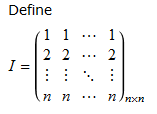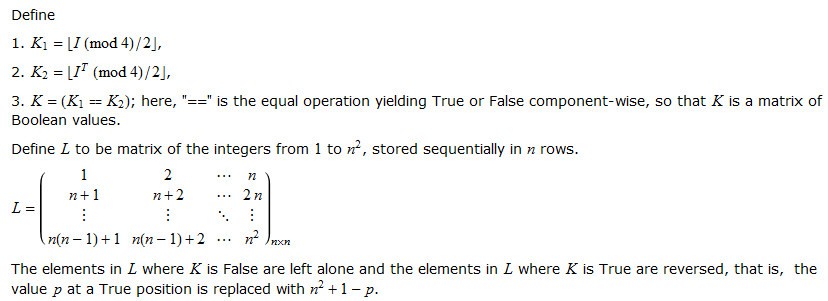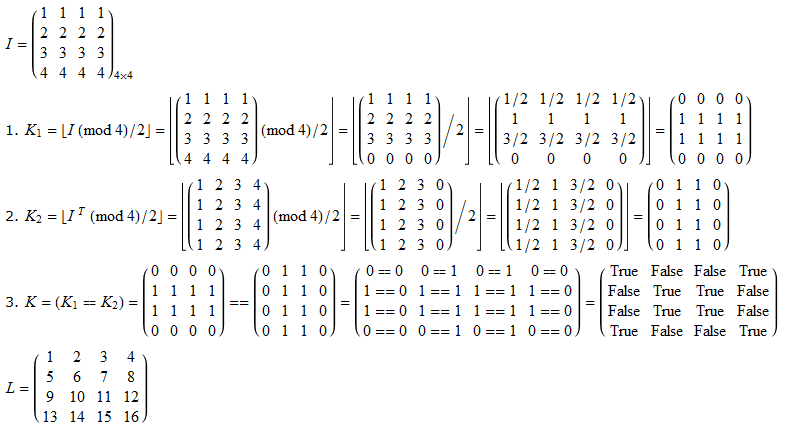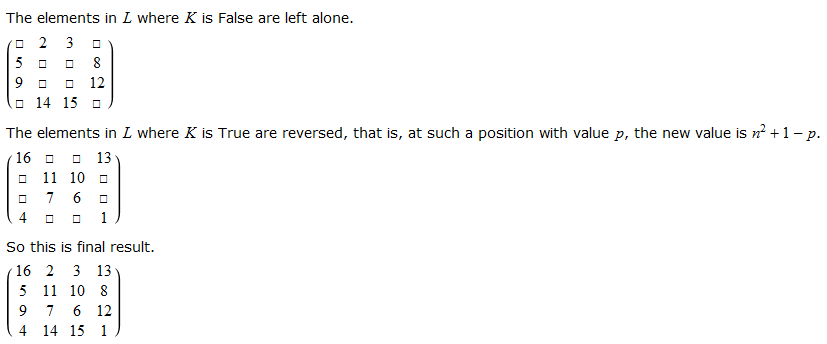The main reason for the slowness of the magicSquare is that your failed to insist on vecterization. (you're already aware of its importance, right? ) Making use of the internal functions owning Listable attribute and treating lists as a whole as much as possible, it's not hard to come to the following:
magicSquare2[n_] /; Mod[n, 4] == 0 :=
Module[{mat, square, bools}, mat = ConstantArray[Range[1., n], n];
square = Partition[Range[n^2], n];
bools = UnitStep@-Abs[# - #\[Transpose] &@Floor[Mod[mat, 4]/2]];
n^2 + 1 - #1 &@square bools + (1 - bools) square]
ans1 = magicSquare[3000]; // AbsoluteTiming
ans2 = magicSquare2[3000]; // AbsoluteTiming
{23.320632, Null}
{0.796866, Null}
Two other tiny changes I've made in magicSquare2 are
- Use
ConstantArray instead of Table.
- Change
Range[n] to Range[1., n] so mat will become a MachinePrecision
matrix and the calculation of Mod[mat, 4]/2 will be sped up.
If you have a C compiler installed:
magicSquare3[n_] /; Mod[n, 4] == 0 := cfmagicSquare3[n]
cfmagicSquare3 =
With[{g = Compile`GetElement},
Compile[{{n, _Integer}},
Module[{mat1, mat2, square},
mat1 = Floor[Mod[Table[Range[1., n], {n}], 4]/2];
mat2 = mat1\[Transpose];
square = Partition[Range[n^2], n];
Table[
If[g[mat1, i, j] == g[mat2, i, j], n^2 + 1 - g[square, i, j],
g[square, i, j]], {i, n}, {j, n}]], CompilationTarget -> C,
RuntimeOptions -> "Speed"]];
ans3 = magicSquare3[3000]; // AbsoluteTiming
{0.281241, Null}
Tricks used in the above piece of code are almost all inherited from this post. The only thing I can add here is, mat2 = mat1\[Transpose]; is necessary for speed, I'm not sure about the reason, maybe it's because that if one eliminate this line and use g[mat1, i, j] == g[mat1, j, i] in the last Table, g[mat1, j, i] will cause more frequent access for the higher dimension of mat1, which is slower than that for lower dimension. (You remember the truth that for n = 10^3; test = RandomReal[1, {n, n}];, test[[All, 1]] is slower than test[[1]]? )
As to the magicQ, despite of the mistake mentioned in the comment above, I think it's already quite efficient and simple. Of course one can create a faster one, still, by compiling to C:
With[{g = Compile`GetElement}, Block[{check1, check2},
check1[mat_, n_, tot_]:= Do[If[Sum[g[mat, i, j], {j, n}] != tot, Throw@False], {i, n}];
check2[mat_, n_, tot_]:= If[Sum[g[mat, j, j], {j, n}] != tot, Throw@False];
cfmagicQ2 =
Hold@Compile[{{mat, _Integer, 2}},
Module[{n = Length@mat, mat2 = mat\[Transpose], mat3 = Reverse[mat], tot},
tot = (n^3 + n)/2;
Catch[check1[mat, n, tot]; check1[mat2, n, tot]; check2[mat, n, tot];
check2[mat3, n, tot]; True]], CompilationTarget -> C,
RuntimeOptions -> "Speed"] //. Flatten[DownValues /@ {check1, check2}] //
ReleaseHold];
magicQ2[mat_?MatrixQ] /; Equal @@ Dimensions@mat := cfmagicQ2[mat]];
test = ans3; test[[100, 100]] = 0;
ans3 // magicQ // AbsoluteTiming
test // magicQ // AbsoluteTiming
ans3 // magicQ2 // AbsoluteTiming
test // magicQ2 // AbsoluteTiming
{0.156215, True}
{0.156223, False}
{0.062461, True}
{0.046865, False}
Tricks for speeding up the compiled code is the same as those used in magicSquare3. Throw and Catch will make the calculation stop once the matrix is detected as "non-magic" thus judgement for non-magic square is sped up. Notice that I've used a code auto-generation technique for simplicity, which is inherited from this post.





magic1? By the wayTr@Transpose@matshould be something likeTr@Reverse@mat. $\endgroup$